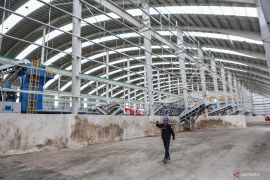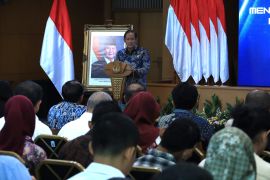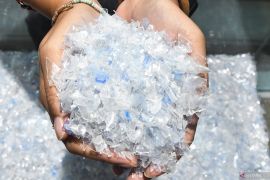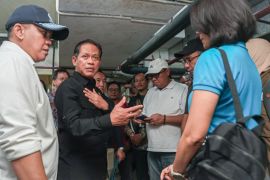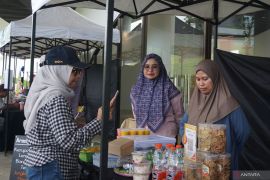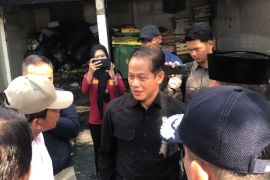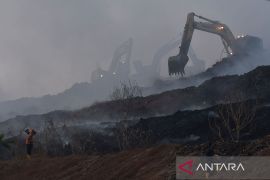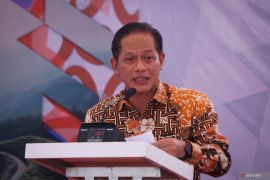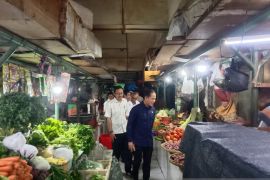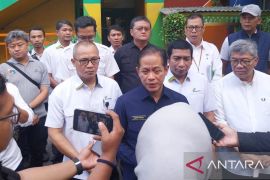No specific names have been mentioned with regard to the party that would likely be named A suspect but Finance Minister Agus Marto Wardoyo said the importers must account for the importation of the goods, yet presumption of innocence must also be observed.
Before naming a suspect, Indonesian officials carefully examined the contents of the containers to make sure they were hazardous and toxic wastes (B3). At least three state agencies are now involved in the investigation, namely the finance ministry, the office of the environment minister and the customs and excise office.
The office of the minister for environment has, since Feb. 10, opened 96 containers of hazardous wastes and taken 56 samples to be tested to assure they contained hazardous and toxic materials.
"We are going to open all of the containers and take the samples to be tested in an effort to obtain evidence," Sudaryono, deputy to the environment minister, said on Monday.
The samples taken from the containers were in the form of waste, soil, oil, lubricants, plastics and VCD compact discs. They are now undergoing laboratory tests to determine what toxic substances they contain.
Sudaryono said besides finding evidence, his ministry will also name suspects. After collecting enough proof, the case will then be turned over to prosecutors and the containers returned to the countries of origin.
Recently, the customs office seized 113 containers of scrap metal, each weighing 28,200 kilograms, allegedly contaminated with hazardous and toxic waste, known as B3, at Tanjung Priok Port in North Jakarta. They were reportedly imported by PT HHS.
Those containers, of which 89 from England and 24 from the Netherlands, came in five shipments between late December and January from the Port of Felixstowe, England, and the Port of Rotterdam, the Netherlands.
The discovery of the B3 materials began when the customs and excise officers became suspicious about the goods. The documents said the containers contained scrap metal.
Environment Minister Balthazar Kambuaya said scrap metal was not banned from entering Indonesia. "However, the material must be safe and clean. These [materials] look like garbage. Some of them are wet, some are dry and some even drip smelly liquids. These clearly violate the law," he said.
Because they were suspicious, customs officers cooperated with officials from the office of the minister of environment to look into the matter, and it was then discovered that the containers held B3 materials.
Indonesian law, namely Law No. 32 / 2009 on The Environment regulates the ban on importing hazardous and toxic substance while Law No. 18 / 2009 also regulates the ban on waste disposal.
According to Finance Minister Agus Marto Wardoyo, Indonesia is basically open to the importation of any goods by foreign firms as long as it is done in accordance with regulations in force in the country.
"We welcome and invite investment into Indonesia but they must abide by the law, including the law on the environment,"Agus said.
The waste allowed for importation applies to material waste which has obtained notification from the ministry of environment. The 113 containers had the proper permits, but did not have the correct notification documents from the ministry of the environment.
Agus, Environment Minister Balthasar Kambuaya and customs and excise officials have taken a look at the 113 containers filled with sleek scrap mixed with a chemical substance.
The minister said that Indonesia allowed the importation of scrap steel but the 113 containers were suspected to have been imported not based on regulations because they were still mixed with chemical substance, waste and soil.
"It would be seen whether they would be re-exported or be taken to court," he said.
Wardoyo said that many countries actually knew that certain goods were B3 and were not allowed to enter Indonesia, yet their importers in Indonesia imported them. Indonesia has signed the Basel Convention which regulates the movement of wastes among nations.
In the meantime, environmental activists urged the government to take harsh action against any companies or individuals who bring waste products to Indonesian soil.
The Indonesian Forum for the Environment`s (Walhi) mining and energy campaign manager Pius Ginting was quoted by the Jakarta Post last week as saying that the government should take legal action against the import of waste, regardless of whether it was dangerous or not, because it would damage the environment.
"We must reject imported waste for any reason as it might double the country`s environmental damage. It is unfair to allow waste, which mostly contains minerals, to be imported to Indonesia after the country suffers environmental damage in producing [minerals] for the sake of exports," he said. (*)
Reporter: By Andi Abdussalam
Editor: Kunto Wibisono
Copyright © ANTARA 2012
